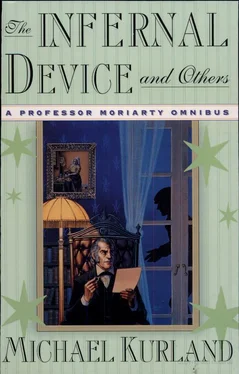"The three who accompanied you are in my employ, as you should have surmised," Moriarty said. "They conceived it to be part of their function to send me a report on your behavior. Actually, there are many favorable points in the report. I would like to have seen the way you smiled and mumbled inanely at that Austrian border guard until he gave up and let you through. And you acquitted yourself quite well in dealing with the conductor on that Italian train, although you should have arranged things so that he was never called."
"That woman called me a thief," Barnett protested.
"There is no magic in epithets," Moriarty said. "You don't have to ward off their effects by disputing them."
"I suppose you're right," Barnett said, grudgingly. "Still, it grates."
Moriarty returned the notebook to his pocket. "I am satisfied that, if induced to exercise discretion, you would be a competent and useful assistant to me. Are you ready to discuss the terms of your employment?"
"I'd like to know what the job is," Barnett said. "I have gathered over the past few weeks that you are no ordinary professor. What is this consulting business of yours?"
"First we must have an understanding. All else is open to discussion, save this one thing only: you must never divulge anything that you learn while in my employ — not about me, my associates, my activities, my comings and goings, my possessions, my household, nor indeed anything at all related to your employment. This ban does not terminate when and if your employment terminates, but is to continue throughout the remainder of your life. And beyond."
"Beyond?"
"Words outlive people. You must not keep a diary or write an autobiography or memoir that in any way touches upon the time you spend with my organization."
"That's quite a ban," Barnett said.
"Can you keep it?"
"I reckon so."
"Regardless of whether you agree or disagree with any of my activities, whether you find them in opposition to your religion or ethics or even morally repugnant to you?"
Barnett gave a low whistle. "That is quite a ban!" he said.
"Can you keep it? Can you give me your unqualified word?"
"What if I say no?"
"I dislike indulging in idle supposition, Mr. Barnett. Say either yes or no, and we shall continue the discussion on that basis."
"Well, about these, ah, morally repugnant acts — if I find any of your activities to be offensive to me, am I obliged to engage in them myself?"
"Certainly not, by no means. It would not be to my interest to employ a man for a job he finds offensive."
"Well, with that understanding I guess I can keep my mouth shut about your doings. And I confess that with this preamble you've got me mighty curious as to just what these doings might be."
Professor Moriarty slipped a pair of pince-nez glasses onto his nose and peered through them at Barnett. "You swear to keep your silence?" he asked.
"Cross my heart, Professor," Barnett said, with a wide smile.
"There is less humor in this than you think," Moriarty said, "for I shall hold you to that oath. So think on it seriously and give me a serious answer."
Barnett raised his hand. "You have my word, Professor Moriarty, that I shall never speak of your affairs to anyone. I swear this on the memory of my mother, which I hold sacred. And if that's not good enough for you, I can't offer anything better."
"That completely satisfies me. As you become privy to my affairs, you will see why I require such an affirmation from all my associates. And you will also see how seriously I regard it." He took a pocket-watch from his waistcoat pocket and snapped it open. "We shall regard your employment as commencing now," he said. "It is five past two in the afternoon of Tuesday, May fifth, 1885."
"Is it?" Barnett asked. "I had quite lost track of the days."
"On the hour of two P.M. on May fourth, 1887—which will be, I believe, a Wednesday — you are quits with me. Until then you are in my employ at an annual salary of — let me see — how much were your New York City employers paying you?"
"Ten dollars a week," Barnett said. "They discourage anyone from thinking of his employment on an annual basis."
"I shall make it five pounds a week," Moriarty said, "if that is satisfactory."
"Satisfactory?" Barnett laughed. "Why, that's well over twice as much. I'll say it's satisfactory!"
"And then, of course, there's your room," Moriarty said. "Since it is at my request that you'll be living in this house, I can't very well charge you rent. So you may consider your room and such meals as you eat here as complimentary. And incidentally, I think you'll find Mrs. Randall a more than adequate cook."
"Then you want me to keep that room?"
"Is it satisfactory?" Moriarty inquired. "If so, I would have you keep it."
"Exactly what is my position to be in your organization?" Barnett asked. "And exactly what sort of organization do you have?"
"I solve problems," Moriarty told him. "I am a consultant, taking on my clients' problems for a fee. Some of them are purely cerebral, and I solve those by sitting in my study, or working in my laboratory, or taking a long walk through London; I find walking very stimulating to the mental processes. But other problems require deductive or inductive reasoning from facts, from evidence; and that evidence must be assembled. And each glittering fact must be tested, like a gold sovereign, to see if it rings true."
"I see," Barnett said.
Moriarty smiled, "By which you mean you do not see. But you soon will, you soon will." He removed his pince-nez glasses, cleaned them with a piece of flannel from his desk, and then replaced them firmly on his nose. "Your hours are to be those required to accomplish your assignment, when you have one," he continued. "In recompense, when you have no assignment you are free to do as you like whatever the time of day. We have not allowed the concept of 'office hours' to infiltrate our little domain."
"That's agreeable," Barnett said. "I much prefer that scheme, as a matter of fact. Do you have anything for me now?"
"Anything for you…" Moriarty rubbed his chin with his left hand. "I think you'd better use the first few days to get acquainted with my household and my organization. If you need anything, ask Mrs. H, the housekeeper, or Mr. Maws, the butler. I shall arrange to have someone show you around the rest of the organization and introduce you to those whom you should know or who should know you."
"Very good, Professor. And I haven't as yet had a chance to thank you for rescuing me from that Turkish jail. I have no doubt that you saved my life."
"I think we shall both benefit from your, ah, timely release," Moriarty said. He offered Barnett his hand, which was firmly taken. "Welcome to my employ, Mr. Barnett," he said.
"I trust you don't have to go quite so far afield for all your employees, Professor."
"If you mean Constantinople," Moriarty said, "that is unique. If you mean prison, you would be surprised at the number of people working for me in one capacity or another who were found in prison. There is one characteristic you do not share with the others. You were innocent."
With that, Moriarty dismissed Barnett and returned to his scientific note-taking.
-
Barnett returned to the ground floor and hunted up Mrs. H, who was in a small room off the pantry. "You're in my office, Mr. Barnett," she told him as he looked curiously around the room. "What may I do for you?"
"I was wondering if it was too late to get some lunch," he asked her. "I spent the morning wrapped up in a rug."
"Go into the dining room, Mr. Barnett," she said. "I shall see that you are served."
"Thank you, Mrs. H," he told her. "I appreciate it."
"Humpf," she said.
Barnett retreated to the dining room, where he was shortly served a large omelette with jam, by a somber-looking maid-of-all-work who curtsied before scurrying out of the room. He found the omelette excellent, and as he sat eating in comfort for the first time in over a month, he fell to musing over his recent past and his probable future.
Читать дальше












